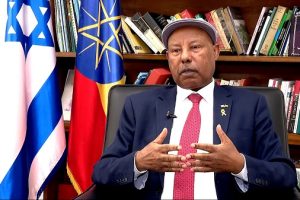
ADDIS ABABA – The Russian Center for Science and Culture (The Pushkin Center) continues to play a crucial role in fostering mutual understanding and cooperation, significantly contributing to the deep-rooted cultural diplomacy between the two nations.
Speaking to the Ethiopian Press Agency (EPA), the Pushkin Center Director Alexander Evstigneev stated that the flourishing cultural diplomacy between Russia and Ethiopia began just months before the end of World War II. This demonstrates the USSR’s longstanding dedication to building strong cultural ties with Ethiopia.
“The Pushkin Center was established in 1969, and our cultural and educational events have continued uninterrupted since then,” Evstigneev noted, emphasizing the center’s pivotal role in the bilateral relationship.
Over the years, the center has hosted numerous significant events, including concerts, exhibitions, and academic conferences, all aimed at enhancing mutual understanding between the two countries. The director also noted the growing popularity of Russian language courses at the center, with Ethiopian participants increasing from around 40 last year to over 60 this year.
The Pushkin Center’s role as a facilitator of educational exchanges has also expanded significantly. Evstigneev revealed that the number of Ethiopian students studying in Russia under scholarship programs has more than doubled, from 35 last year to 100 this year.
“It is about the strength of ties between our cultures. When youngsters go to Russia to study, they gain extensive knowledge about our country, culture, and business. This knowledge is very significant for both countries in the future,” he explained.
The director also mentioned that two Moscow schools have recently introduced Amharic language courses, demonstrating a growing interest among Russian school children in Ethiopian history and culture.
Evstigneev emphasized the deep religious and cultural ties between the two countries, noting their shared traditions, including Orthodox Christianity. The center aims to showcase these connections through various cultural events.
Additionally, the center seeks to provide a platform for Ethiopian artists, painters, and authors. It plans to host an Ethiopian fashion show and an exhibition of Ethiopian paintings in the coming months, further strengthening cultural exchanges.
Looking ahead, the Pushkin Center has several major events planned, including a food security conference in October, which will bring together delegates from across Africa, and a cultural conference focusing on the fundamental connections between science, culture, and education. “We are trying to increase the bonds beyond the two countries,” Evstigneev said.
With Ethiopia’s membership in the BRICS community, the director emphasized the importance of further expanding cultural, educational, and scientific cooperation between Russia and Ethiopia, aiming to connect people and institutions across the two nations.
BY FIKADU BELAY
THE ETHIOPIAN HERALD TUESDAY 9 JULY 2024




